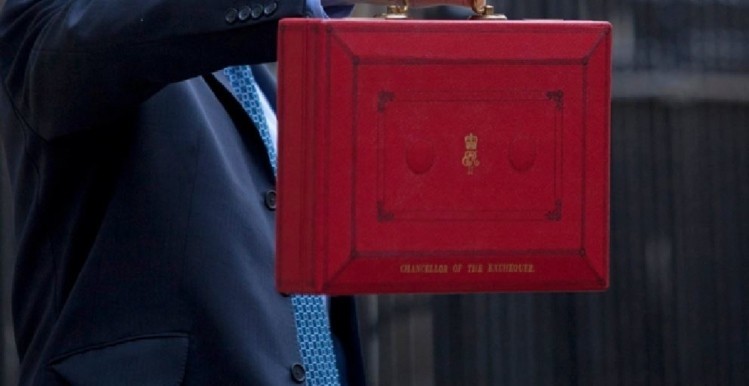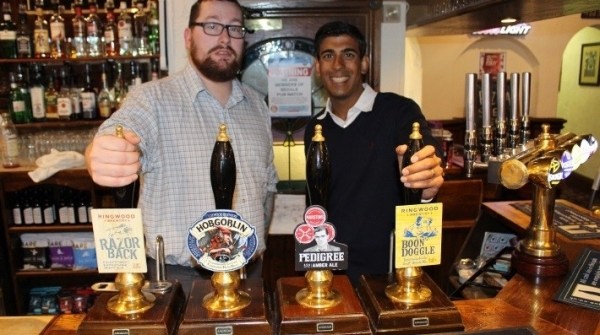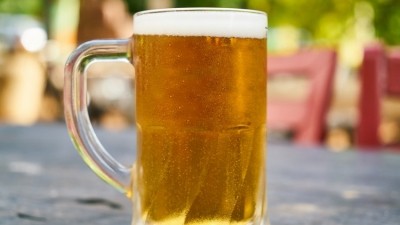Budget 2020
Budget 2020 – Duty increase on beer, cider, wine and spirits frozen

13:14 – New plastic packaging tax
From April 2022, the Government will charge manufacturers and importers £200 per tonne on packaging made of less than 30% recycled plastic.
13.05 – Beer duty FROZEN
The Chancellor has announced the planned rise for beer duty has been cancelled after heavy lobbying by the industry.
Sunak said: “Pubs are at the centre of community life. But too many have closed over the past decade.
“For only the second time in almost 20 years, that’s every single one of our alcohol duties frozen.”
13:04 – Wine and Spirit duty increase CANCELLED
The Chancellor had been forecast to announce that wine and spirit duties will rise in line with RPI inflation – most recently forecast at 2.8%.
However, alongside the announcement of £10m in research and development to help Scotch whisky distilleries go green, Chancellor Rishi Sunak has cancelled duty increases to wine and spirit duties. The first time in 20 years that all alcohol duties have been frozen.
It had been estimated that duty increases in line with RPI would add approximately 6p to the price of a 750ml bottle of wine and 8p to the cost of 750ml bottles of sparkling or fortified wine, by the Wine and Spirits Trade Association (WSTA).
Freezing all alcohol duties for another year. #Budget2020pic.twitter.com/KVcBwFvig6
— HM Treasury (@hmtreasury) March 11, 2020
13:01 – NLW to reach £10.50 in next four years
The national living wage will be almost £10.50 an hour by 2024, Sunak has announced.
12:59 – Responding to the immediate effect of coronavirus
“This Budget responds at scale to the immediate effect of coronavirus and it reports on an economy whose foundations are strong and provides for security today.”
12:46 – Business rates for pubs with RV of under £51k abolished
Pubs with a rateable value of less than £51,000 will have business rates abolished for the next year, Chancellor Rishi Sunak has announced in today’s (11 March) Budget.
This follows calls for a business rates reduction from trade bodies including UKHospitality.
Sunak said: “Our manifesto promised that for shops, cinemas, restaurants and music venues with a rateable value of less than £51k, we would increase their business rates retail discount to 50%.
“Today, I can go further and take the exceptional step for this coming year of abolishing their business rates altogether.
“But there are tens of thousands of other businesses in the leisure and hospitality sector not covered by this policy.
“Museums, art galleries and theatres, caravan parks and gyms, small hotels and B&Bs, sports clubs, nightclubs, club houses, guest houses, they would not benefit from today’s measure but they could be some of the hardest hit.
“For this year, I have decided to extend the 100% retail discount to them as well. That means any eligible retail, leisure or hospitality business with a rateable value below £51,000 will, over the next financial year, pay no business rates whatsoever.”
Additionally, there will be a £5,000 discount in business rates for pubs with a rateable value up to £100,000.
Sunak added: “That is a tax cut worth £1bn, saving each business up to £25,000. It means, over the next 12 months, nearly half of all business properties in England will not pay a penny of business rates.”
He went on to say there will be a review into the long-term impact of business rates
Sunak added: “I’m also launching, today, a fundamental review to be included at the Autumn Budget into the long-term future of business rates.
“But even with the temporary extension of the retail discount to the leisure and hospitality sectors, many of our smallest businesses that already pay no business rates so would not benefit from this policy.
“So to support them to manage their fixed costs, I am going to go a step further.
“I am providing, to any business, currently eligible for the small business rate relief a £3,000 cash grant per business.”
12:45 – Rates relief for businesses over coronavirus
The cost of people taking time off work will be felt by businesses, the SMEs in particular. In recognition of this, the Chancellor has, for business with fewer than 250 employees, for up to 14 days, refunded sick pay by the Government, which could provide over £2bn for millions of businesses.
HMRC has been asked to scale up time on how long business have to pay taxes with over 2,000 staff in call centres available to deal with this.
Businesses will also be given access to a new temporary coronavirus interruption loan scheme of up to £2m and could reach a total of £1bn.
Shops, cinemas, restaurants and music venues rateable less than £51,000 will pay no business rates, a cut worth £1bn and saving many businesses £25,000.
If further action is needed, the Government will act.
12:39 – There will be a significant impact on the economy
Up to a fifth of the working population could need to be off work at any one time. There will be a disruption to supply and could mean, for a period, our productive capacity will shrink. There will also be a reduction in consumer spending.
The combination of those effects will have a significant impact on the economy but it will be temporary and life will return to normal.
The strategy to deal with it: we can’t avoid a fall in demand because a primary driver in not people spending as normal is people following doctors’ orders to stay at home.
The Government is to provide security and support to people who get sick and can’t work, with statutory sick pay being paid from day one and will also be available for all of those advised to self-isolate even with no symptoms and will be able to get a sick note from 111 and not the doctors. Self-employed will be given access to the relevant benefits immediately too.
Gig economy and self-employed workers will be able to access benefits quickly and easily, and will be able to claim from day one instead of day eight.
A total of £1bn will be available to support the finances of Brits.
On the supply side, the right response is to provide a bridge for services to ensure the impact does not become permanent.
Government in constant communication with the Bank of England to make sure the economy doesn’t suffer too much, such as today’s interest rate reduction from 0.75% to 0.25% would be a big help.
12:36 – Coronavirus a threat, but public and business will be protected
The Chancellor started the Budget briefing by outlining people’s personal and financial worries over coronavirus. “We are doing everything we can to keep this country and our people healthy and financially secure.”
Highlighted that the Government would put aside politics to resolve it and reiterated that leading UK scientists were working hard.
“We will get through this together. The British people may be worried but they are not daunted we will protect our country and people and will rise to the challenge. This virus is the key challenge facing our country but it is not our key challenge. We have just had an election where people voted for change to our economy and this budget delivers on that change.”
12:19 – Who is Chancellor Rishi Sunak?
Rishi Sunak is a former investment banker and in 2017, after succeeding former Conservative Party leader William Hague as an MP for Richmond in North Yorkshire, he carried out a survey of pubs in his constituency.
The teetotal MP wrote to almost 200 pubs in his area to gain information on issues within the industry.
At the time, he said: "Pubs are cornerstones of rural areas like ours. Not only do they provide employment for hundreds of local people, but they lie at the heart of so many communities and help to sustain the local fabric of North Yorkshire."
His interest was sparked after several pubs in his rural constituency closed and the information gathered allowed him to better debate about the pub trade in parliament.
After being appointed chief executive to the Treasury in July 2019, Sunak took up office as Chancellor of the Exchequer on 13 February 2020, replacing Sajid Javid, who held the post from 24 July 2019.
09:30 – How can the Budget 2020 help pubs?
Trade heavyweights have been calling for a reduction or waiving of business rates if the impact of the coronavirus stops people from visiting pubs.
1) Business rates relief
UKHospitality chief executive Kate Nicholls wrote to the Government calling for a three-month suspension on business rates for the industry.
This followed a drop of 7% in the number of people eating and drinking out of home.
2) VAT cut
A cut in the tax on goods and services that, at the moment is 20%, would likely give customers more incentive to spend in pubs and bars.
3) Financial reassurance of zero-hour workers
Guaranteed support for hospitality workers on zero-hours contracts and those who are self-employed, should they have to self-isolate due to the coronavirus, would help the trade maintain its workforce.
The Government must set out and commit to a system that takes pressure off the hospitality sector in cases like this.
4) Financial support for indies
The Federation of Small Businesses has urged the Chancellor to ring-fence funds to support small and independent businesses that have lost trade following the outbreak of coronavirus.
Such a fund would likely compensate pubs that have seen a drop in trade due to the virus outbreak.
08:04 – WSTA bolsters calls for wine and spirits duty cut
The Wine and Spirit Trade Association (WSTA) has highlighted the growing tax pressures its producers have faced since 2014.
According to the organisation, wine duty for the period has risen by 12%, spirits by 2% and cider by 2%, while beer duty has declined overall by 0.2%.
Such high taxes on wine are claimed to ‘disproportionately penalise’ women, according to a recent survey by YouGov.
It’s Budget day! The big day is finally upon us - our #deadlineday equivalent minus Harry Redknapp and Jim White....
— WSTA (@wstauk) March 11, 2020
.@RishiSunak good luck today, your predecessors have passed on the following increases over the years...isn’t it time to buck the trend?#Budget2020pic.twitter.com/qr65QuBmlk
07:00 – Bank of England slashes interest rates
The Bank of England has announced it has cut interest rates from 0.75% to 0.25%, a move that has taken borrowing costs back down to the lowest level in history.
Billions of pounds are also expected to be freed up following the move, which will also give additional lending power to help banks support businesses, the Bank of England said.
Sensible and helpful steps which now need to be passed on immediately to help businesses facing a cash flow crisis. We now need support and time to pay from landlords, local authorities and govt https://t.co/ikUYTYnrFv
— Kate Nicholls (@UKHospKate) March 11, 2020
10 March – SIBA calls for progressive beer duty changes
The Society of Independent Brewers (SIBA) has urged Chancellor Rishi Sunak to improve progressive beer duty to allow craft brewers to better compete in the beer market.
Current rules mean taxes rise sharply for brewers who produce more than 5,000hl of beer a year, which equates to around 900,000 pints.
SIBA chief executive James Calder said the tax effectively means brewers’ bills can “rocket overnight”.





